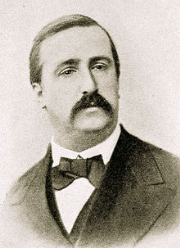Alexander Porfiryevich Borodin
Alexander Porfiryevich Borodin (12 November 1833 – 27 February 1887) was a Russian Romantic composer of Georgianorigin, as well as a doctor and chemist. He was one of the prominent 19th-century composers known as The Mighty Handful, a group dedicated to producing a uniquely Russian kind of classical music, rather than imitating earlier Western European models.
Borodin is best known for his symphonies, his two string quartets, the tone poem In the Steppes of Central Asia and his opera Prince Igor. Music from Prince Igor and his string quartets was later adapted for the US musical Kismet. A notable advocate of women's rights, Borodin was a promoter of education in Russia and founded the School of Medicine for Women in Saint Petersburg.
As a chemist, he is best known for his work in organic synthesis, including being among the first chemists to demonstrate nucleophilic substitution, as well as being the co-discoverer of the aldol reaction.














 My Wish List
My Wish List











